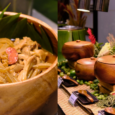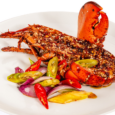Our country is a huge coffee-centric nation. Unlike other Asian countries who place a huge emphasis on tea, coffee is a huge part of our culture — we have it in the morning, for merienda, during a break at work, and even at night. Yet there is so much more to the rich bean than just our standard 3-in-1 formulas that we grew up with. Coffee is actually much more complex than that, carrying with it a rich history since it was discovered hundreds of thousands of years ago.
There are those from around the world who take lots of care to cultivate the bean and harvest high-quality coffee beans, giving it depth in flavor with exciting notes such as chocolate, flowers, fruits, berries and more. This is called specialty coffee. As coffee is undoubtedly part of our culture, here are 4 fun and interesting facts you didn’t know about coffee.
4. All coffee came from Ethiopia.
While coffee is grown in various parts of the world with different flavors, all of these can be traced back to a single origin in Ethiopia many, many years ago.
3. Arabica and robusta are two of the world’s most popular beans.
As there are different strains of coffee beans, Arabica and robusta are two of the most sought-after beans in the world. Arabica is grown in the highlands and is more sought after, and is usually used for specialty coffee, while Robusta is grown in the lowlands, is bitterer, has higher caffeine content, and is used for blends and 3-in-1 products.
2. Countries under the “coffee belt” are those that can grow coffee.
These countries are usually described as tropical regions. Countries that fall between the Tropics of Capricorn and Cancer are part of the coffee belt, the regions that can grow coffee. It’s interesting as beans and flavors can vary from region to region, with each region possessing a different kind of flavor, and can even be different from farm to farm! South America, for example, can be medium-bodied, chocolatey and floral, while those from Africa are full-bodied, fruity and nutty. Asian coffees can range from low to medium acidity and are usually earthy and nutty.
1.Coffee doesn’t have to be bitter.
As those who grew up with either brewed or 3-in-1 coffee, we only know coffee to be two things: either sweet or bitter. Yet there are so many varietals of coffee beans, grown in various parts of the world and in different circumstances that they can taste a variety of complex flavors, whether it’s floral, nutty, fruity, wine-like, or even chocolate-y and so much more. These various types of beans, along with a light to medium roast can bring out more notes and exciting tastes. Specialty coffee beans are those harvested from a single farm and under special circumstances, and possess complex flavors due to its high quality as well. If done right, you don’t need to add milk or sugar to your coffee as it alone has interesting flavor notes that will please your senses.
Interested in these tidbits? You can learn more about specialty coffee at Enderun’s The Study program Intro to Specialty Coffee 101– helpful for those who want to expand their knowledge on coffee, start a business or even become a barista! Andre Chanco of Yardstick Coffee, an accredited trainer of the Specialty Coffee Association in Europe (SCAE) handles the course. It comes with a certification exam recognized by the SCAE, a non-profit membership association that has established an enormous network of coffee lovers and industry professionals across more than 90 countries worldwide.
The Study also offers other interesting courses on skills and cultural know-hows in order to pick up a new skill, enrich your mind, and get a headstart at work and social situations.
You can visit them at their website or contact them at (632) 655 3609 or text +639173237662.
The Study at Enderun
(632) 655 3609 or text +639173237662
info@thestudyph.com




